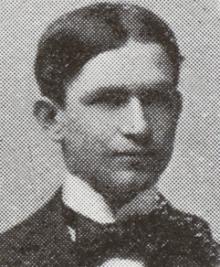- Home
- Archival Material
- College History Projects
- Subject-Based Digital Projects
Samuel N. Deinard (1872-1921)

Samuel Deinard was born on January 25, 1872 in Rossein, Lithuania (then part of the Russian Empire) to David Mendel and Taube Leah Deinard. Deinard spent some of his childhood in Palestine where he attended schools in Jerusalem. He also attended a normal school in Cologne, Germany where he prepared for entry into the University of Heidelberg. By 1894 he was in the United States where he enrolled first at the University of Pennsylvania and then, in 1895, entered the class of 1897 at Dickinson College. Leaving Dickinson after one year, he earned his bachelor's degree at De Pauw University in 1897, his M.A. in 1901 at the University of Chicago and his Ph.D. at the University of Minnesota in 1905.
While at Dickinson, Deinard was elected to membership in the Belles Lettres Society and quickly acquired the nickname "Rabbi." His class yearbook described him as "patriarchal" in appearance with a penchant for the phrase "like the Dickens" and noted that much of his spare time was taken up with writing love poetry. This last observation may have had a connection with his withdrawing from the College, since on May 20, 1896 he married Rose Deinard of Kearney, New Jersey. The couple had three children - Amos Spencer, Benedict Spinoza and Miriam Judith.
Soon after the wedding, Deinard served the Jewish Reformed congregation of Terre Haute, Indiana while finishing his degree at De Pauw. He was in that first post until 1900 when he briefly led a Chicago congregation. In 1901, he entered what was to be his life's work, as rabbi of the Minneapolis, Minnesota Reform congregation. Then known as the Temple Shaarei Tov, or "The Gates of Goodness," he started with an annual salary of $2,000. The congregation dated from 1878 and was the first of its kind in Minneapolis. Almost immediately, Rabbi Deinard was faced with the destruction of the synagogue by fire in 1902 and the rebuilding of the site on the corner of 10th Street and 5th Avenue. He maintained cordial contacts with the more conservative congregations that appeared in the city and worked particularly to facilitate the co-existence between the older, assimilated population and the new waves of Orthodox immigrants arriving from Eastern Europe. He succeeded in this task largely through his efforts as a publisher. His first three attempts in this direction failed, but his last - the founding of American Jewish World in 1912 - did not. The journal became a unifying voice and remains in publication in the Minneapolis/St. Paul area ninety years later.
Notwithstanding his efforts at community, Deinard's own firmly held beliefs remained. His memories of Palestine assured that he was a constant supporter of Zionism and the efforts of those who wished to settle there, despite the opposition from some in his own assimilated congregation. Deinard reached beyond his own congregation to build understanding and social justice; he invited his members to bring their friends to services, and served as the first president of the local chapter of the National Association for the Advancement of Colored People in 1914. Respected as he was for his efforts, the Twin Cities region suffered a great loss when, on the morning of Yom Kippur, October 12, 1921, Rabbi Samuel Deinard suffered a heart attack in his home and died; he was forty-eight years old.
Date of Post:
2005
College Relationship:
Alumnus/Alumna Class Year: